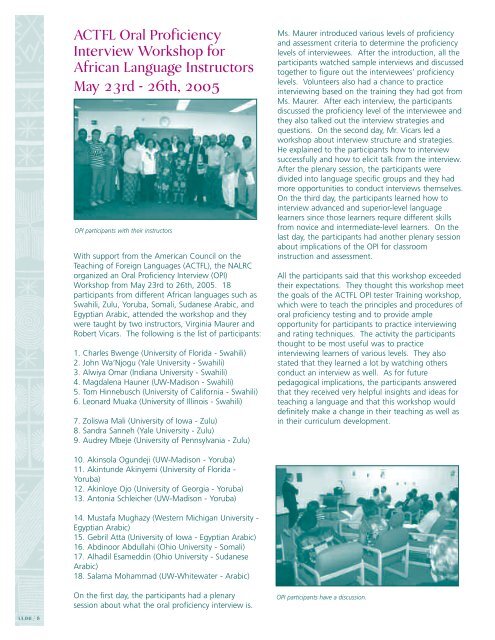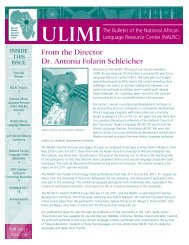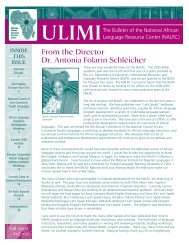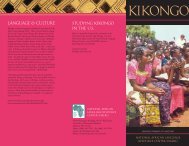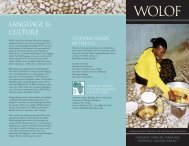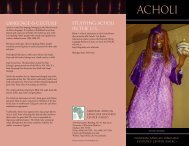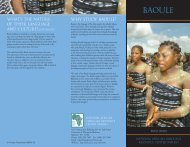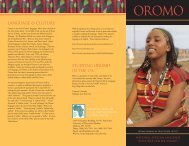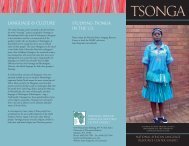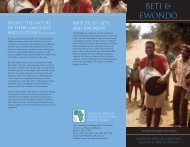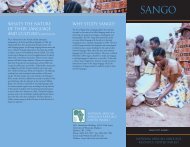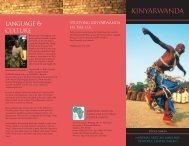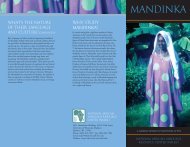ulimi 2005 - National African Language Resource Center - Indiana ...
ulimi 2005 - National African Language Resource Center - Indiana ...
ulimi 2005 - National African Language Resource Center - Indiana ...
Create successful ePaper yourself
Turn your PDF publications into a flip-book with our unique Google optimized e-Paper software.
ACTFL Oral ProficiencyInterview Workshop for<strong>African</strong> <strong>Language</strong> InstructorsMay 23rd - 26th, <strong>2005</strong>OPI participants with their instructorsWith support from the American Council on theTeaching of Foreign <strong>Language</strong>s (ACTFL), the NALRCorganized an Oral Proficiency Interview (OPI)Workshop from May 23rd to 26th, <strong>2005</strong>. 18participants from different <strong>African</strong> languages such asSwahili, Zulu, Yoruba, Somali, Sudanese Arabic, andEgyptian Arabic, attended the workshop and theywere taught by two instructors, Virginia Maurer andRobert Vicars. The following is the list of participants:1. Charles Bwenge (University of Florida - Swahili)2. John Wa’Njogu (Yale University - Swahili)3. Alwiya Omar (<strong>Indiana</strong> University - Swahili)4. Magdalena Hauner (UW-Madison - Swahili)5. Tom Hinnebusch (University of California - Swahili)6. Leonard Muaka (University of Illinois - Swahili)7. Zoliswa Mali (University of Iowa - Zulu)8. Sandra Sanneh (Yale University - Zulu)9. Audrey Mbeje (University of Pennsylvania - Zulu)Ms. Maurer introduced various levels of proficiencyand assessment criteria to determine the proficiencylevels of interviewees. After the introduction, all theparticipants watched sample interviews and discussedtogether to figure out the interviewees’ proficiencylevels. Volunteers also had a chance to practiceinterviewing based on the training they had got fromMs. Maurer. After each interview, the participantsdiscussed the proficiency level of the interviewee andthey also talked out the interview strategies andquestions. On the second day, Mr. Vicars led aworkshop about interview structure and strategies.He explained to the participants how to interviewsuccessfully and how to elicit talk from the interview.After the plenary session, the participants weredivided into language specific groups and they hadmore opportunities to conduct interviews themselves.On the third day, the participants learned how tointerview advanced and superior-level languagelearners since those learners require different skillsfrom novice and intermediate-level learners. On thelast day, the participants had another plenary sessionabout implications of the OPI for classroominstruction and assessment.All the participants said that this workshop exceededtheir expectations. They thought this workshop meetthe goals of the ACTFL OPI tester Training workshop,which were to teach the principles and procedures oforal proficiency testing and to provide ampleopportunity for participants to practice interviewingand rating techniques. The activity the participantsthought to be most useful was to practiceinterviewing learners of various levels. They alsostated that they learned a lot by watching othersconduct an interview as well. As for futurepedagogical implications, the participants answeredthat they received very helpful insights and ideas forteaching a language and that this workshop woulddefinitely make a change in their teaching as well asin their curriculum development.10. Akinsola Ogundeji (UW-Madison - Yoruba)11. Akintunde Akinyemi (University of Florida -Yoruba)12. Akinloye Ojo (University of Georgia - Yoruba)13. Antonia Schleicher (UW-Madison - Yoruba)14. Mustafa Mughazy (Western Michigan University -Egyptian Arabic)15. Gebril Atta (University of Iowa - Egyptian Arabic)16. Abdinoor Abdullahi (Ohio University - Somali)17. Alhadil Esameddin (Ohio University - SudaneseArabic)18. Salama Mohammad (UW-Whitewater - Arabic)On the first day, the participants had a plenarysession about what the oral proficiency interview is.OPI participants have a discussion.ULIMI / 8


